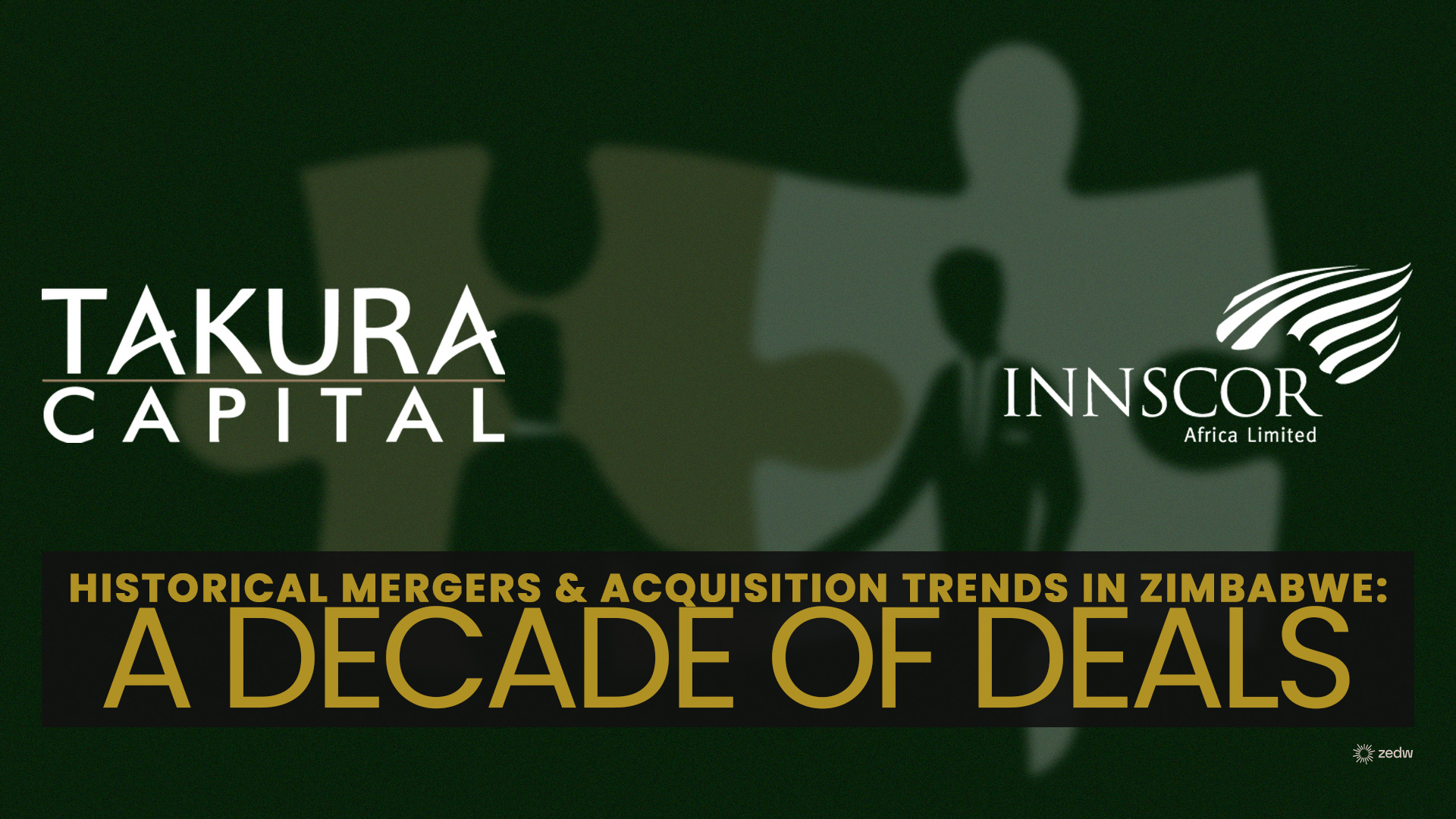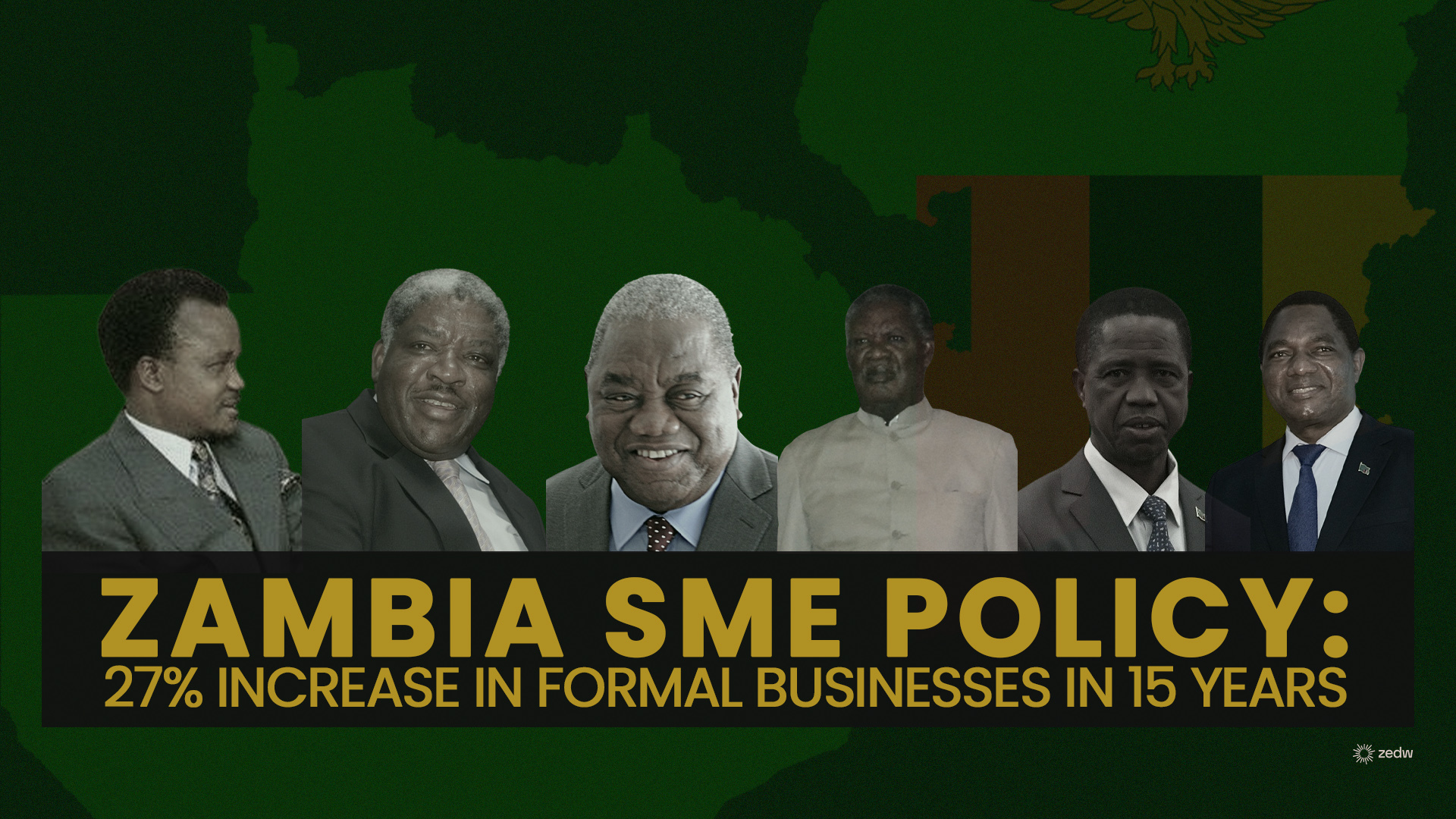Earlier this year we explored why Zimbabwe’s merger and acquisition activity was on a historic pace during the first half of 2023. This article is a follow up to that previous effort to further understand the historical trends that preceded that 6-month period. In order to do so, we went through competition and tariffs reports from 2013 onwards in a bid to map out trends in the local mergers and acquisitions space.
From 2013 through to 2022 we found annual reports for all years except for 2015 and 2019 which were not available. Still the 8 years of available data were enough of a sample size to determine some trends. Here’s what we established:
From 1999 until 2013 there were 253 cases an average of 17 cases annually. From 2013 to 2022 (excluding 2015 & 2019) there were over 137 deals completed in that same period – about 15 deals per year. From these we analysed about 126 deals that the CTC reported on.









Drivers for activity in Manufacturing?
There are a few hypotheses put forward for the activity in the manufacturing sector and fragmentation is one of them. Zimbabwe’s manufacturing sector is characterized by numerous small and medium-sized enterprises (SMEs). This fragmentation limits individual players’ access to resources, economies of scale, and market share. M&A deals offer a way to consolidate the market, creating larger entities with greater reach and efficiency.
Increased competition from regional and international players also puts pressure on Zimbabwean manufacturers. M&As can help companies combine resources, optimize production processes, and reduce costs, making them more competitive.
Another motivator is that bigger manufacturing companies tend to have readily identifiable and valuable assets like factories, equipment, and land, making them attractive targets for M&As. These assets can be readily valued and integrated into the acquiring company’s operations – making them more attractive as M&A targets. Combining manufacturing capacities, distribution networks, and expertise across different companies can create significant synergies, leading to increased efficiency and profitability.
Drivers for activity in Mining and quarrying?
According to the United Nations, Africa is estimated to hold around 30%, 12% and 8% of the world’s mineral reserves, oil and natural gas reserves, respectively. These commodities make Africa attractive for strategic investors. Zimbabwe is no different.
Given that global demand for these resources is expected to continue growing, driven by factors like urbanization, technological advancements, and the transition to clean energy. This presents significant opportunities for Zimbabwe’s mining companies to expand their operations and increase profitability.
Policy has also been said to be playing an effect which the data seems to concur with. 11 of the 15 (73%) mining deals that were part of the data we went through were completed from 2020 onwards. Some of the policy moves expected to further incentivise deal-making include Zimbabwe Investment Development Agency’s (ZIDA) new digital system which the agency claims will allow potential investors to get licensed in 48 hours instead of the 21 or more days previously required.
Who were the recurring deal makers?
From 100 documented deals across the same time period, there were a few recurring deal-makers.
Investors in Africa – Takura Ventures had closed 8 deals whilst Innscor Africa subsidiary – National foods was involved in 7 deals.
Investors in Africa – Takura Ventures M&A involvement
| M&A details | Date | Deal valuation |
| Acquisition of 35% Shareholding in Talwant Trading (Pvt) Limited | 2014 | n/a |
| Acquisition of Lobels Bread | 2015 | US$18mn |
| Acquisition of 95.72% shareholding in Cairns Holdings Limited | 2016 | US$30mn (estimated) |
| Acquisition of the Assets of Plaza Bakery (Private) Limited | 2017 | N/A |
| Acquisition of Manica Boards | 2020 | N/A |
| Acquisition of Caulicle investments | 2020 | N/A |
| Acquisition of New Health 263 P/L | 2020 | N/A |
| Acquisition of Interfresh Ltd | 2021 | N/A |
| Acquisition of 54.75% shareholding in Star Africa Corporation Ltd | 2021 | N/A |
All other companies on this list are household names as you will come to realise as you go down the list. Takura Ventures isn’t a household name and so a bit of additional context will have to be served around the investment company established in 1997.
Takura Capital’s initial mandate was to invest in Zimbabwe but that brief has evolved to include “other SADC countries outside of South Africa.” Since its inception 26 years ago, the company has made over 35 investments in industries such as Agro-processing, Construction, Fast Moving Consumer Goods, Mining and more.
National Foods M&A involvement
| M&A details | Date |
| Acquisition of Breathaway Food Caterers | 2016 |
| Acquisition of 40% issued share Capital of Pure Oil Industries (Pvt) Ltd | 2016 |
| Transactions between National Foods and Probrands | 2016 |
| Acquisition of 50% shareholding in Pangolin Products (Private) Limited | 2017 |
| Proposed Toll Manufacturing Agreement between National Foods Limited and Probrands (Private) Limited | 2017 |
| Acquisition of Gain Cash and Carry (Pvt) Ltd | 2020 |
| Acquisition of Distribution Group Africa | 2021 |
Beyond these two, Coca-Cola Company and Innscor Africa were involved in 3 M&As each respectively.
Coca-Cola Company M&A involvement
| M&A details | Date |
| Acquisition of 60% shareholding in Swaziland Beverages | 2019 |
| Acquisition of Fairy Bottling Zambia | 2019 |
| Acquisition of 53.9% shareholding in Almasi Beverages | 2019 |
Innscor Africa Limited M&A involvement
| M&A details | Date |
| Acquisition National Foods Holding | 2013 |
| Acquisition of Bedra | 2013 |
| Acquisition of Landos Farm P/L | 2021 |
Innscor has a long history of successful acquisitions and integrations. They have a proven ability to identify undervalued assets, negotiate favorable deals, and integrate acquired businesses into their existing operations efficiently. This track record gives them a strong reputation and makes them a trusted partner for potential M&A transactions.
Because of their strong balance sheet Innscor also has access to capital – a key ingredient in any M&A transaction. Innscor has access to various financing options, including local and international debt, equity, and private equity. This allows the business to fund acquisitions more readily than some of their competitors, giving them an edge in competitive bidding processes.
However, it’s important to note that Innscor’s prominence in Zimbabwe’s M&A scene has also attracted some criticism. Some argue that their dominant position gives them an unfair advantage in acquisitions and could stifle competition.
How many deals don’t go over the line?
The CTC doesn’t consistently report on withdrawn mergers but we were able to pick up some details on deals that failed to go over the line during the period in question
| Acquiring firm | M&A details | Date |
| Ashram Investments (Private) Limited | Proposed acquisition of 59% shareholding in Profeeds (Private) Limited and Produtrade (Private) Limited | 2014 |
| Innscor Africa | Amalgamation of the Stockfeed Manufacturing Businesses of National Foods Limited and Profeeds (Private) Limited | 2017 |
| Magister Investments Limited & Tongaat Hulett Limited | 2022 |

Whilst outright rejections are not common – what’s more common are merger applications being rolled over into the next year. Commonly cited causes for these rollovers include staff shortages and a need for upskilling within the commission.
Deal activity within Sub-Saharan Africa and Zimbabwe is expected to increase over the next two years. The post-2020 M&A highs will probably become a sustained narrative in Zimbabwe’s deal-making domain. Nearly half (48%) of the deals completed in 2022 included foreign firms acquiring local companies – perhaps a sign that confidence from outside the country is high and a sign that activity may continue for the foreseeable future.








